初中英语人教版八年级下册第二单元
- 格式:pdf
- 大小:4.57 MB
- 文档页数:33
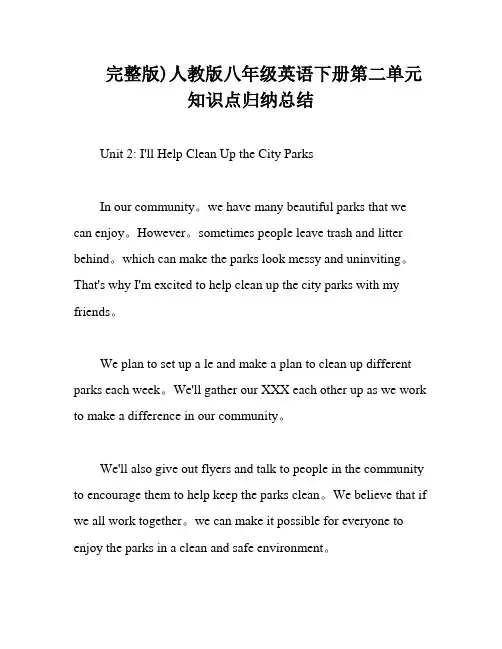
完整版)人教版八年级英语下册第二单元知识点归纳总结Unit 2: I'll Help Clean Up the City ParksIn our community。
we have many beautiful parks that we can enjoy。
However。
sometimes people leave trash and litter behind。
which can make the parks look messy and uninviting。
That's why I'm excited to help clean up the city parks with my friends。
We plan to set up a le and make a plan to clean up different parks each week。
We'll gather our XXX each other up as we work to make a difference in our community。
We'll also give out flyers and talk to people in the community to encourage them to help keep the parks clean。
We believe that if we all work together。
we can make it possible for everyone to enjoy the parks in a clean and safe environment。
I used to think that one person couldn't make a difference。
but I've XXX caring for our community。
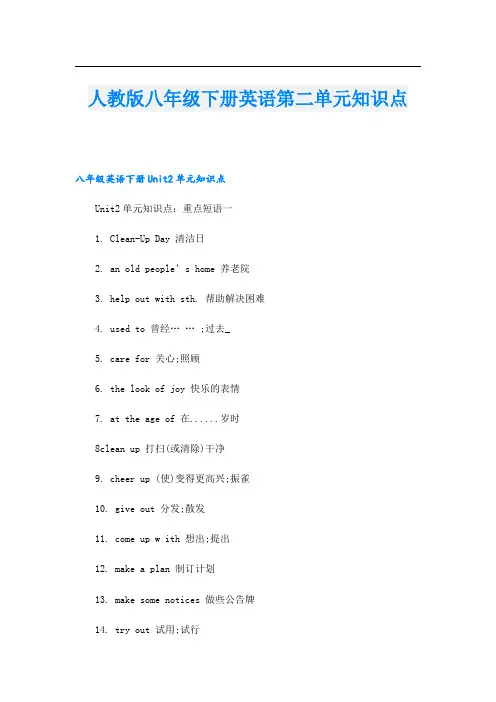
人教版八年级下册英语第二单元知识点八年级英语下册Unit2单元知识点Unit2单元知识点:重点短语一1. Clean-Up Day 清洁日2. an old people’s home 养老院3. help out with sth. 帮助解决困难4. used to 曾经…… ;过去_5. care for 关心;照顾6. the look of joy 快乐的表情7. at the age of 在......岁时8clean up 打扫(或清除)干净9. cheer up (使)变得更高兴;振雀10. give out 分发;散发11. come up w ith 想出;提出12. make a plan 制订计划13. make some notices 做些公告牌14. try out 试用;试行15. work for 为…工作;为…. 效力Unit2单元知识点:重点短语二put up 建造;举起;张贴hand out 分发;散发;发给call up 打电话;召集put off 推迟;延迟for example 比如;例如raise money 筹钱;募捐take after 与......相像;像give away 赠送;捐赠fix up 修理;修补;解决be similar to 与……相似set up 建立;设立disabled people 残疾人make a difference 影响;有作用be able to 能够after-school reading programUnit2单元知识点:重点句型1. The boy could give out food at the food bank.这个男孩可以在食品救济站分发食物。
2. Clean-Up Day is only two weeks from now.清洁日离现在仅仅两周的时间。
3. He volunteers at an animal hospital every Saturday morning. 每周六上午,他都在一家动物医院当志愿者。
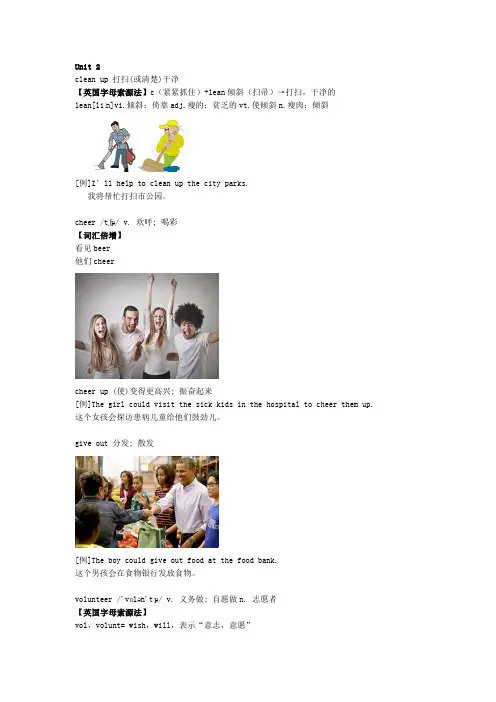
Unit 2clean up 打扫(或清楚)干净【英国字母索源法】c(紧紧抓住)+lean倾斜(扫帚)→打扫,干净的lean[liːn]vi.倾斜;倚靠adj.瘦的;贫乏的vt.使倾斜n.瘦肉;倾斜[例]I’ll help to clean up the city parks.我将帮忙打扫市公园。
cheer /tʃɪə/ v. 欢呼; 喝彩【词汇倍增】看见beer他们cheercheer up (使)变得更高兴; 振奋起来[例]The girl could visit the sick kids in the hospital to cheer them up. 这个女孩会探访患病儿童给他们鼓劲儿。
give out 分发; 散发[例]The boy could give out food at the food bank.这个男孩会在食物银行发放食物。
volunteer /'vɒlən'tɪə/ v. 义务做; 自愿做n. 志愿者【英国字母索源法】vol,volunt= wish,will,表示“意志,意愿”volunteer n 志愿者(volunt+eer人→意愿的人→志愿者)voluntary a 志愿的,自愿的(volunt+ary)[例]The girl could volunteer in an after-school study program to teach kids. 这个女孩会在一个课外学习项目中担任自愿者来教孩子。
come up with 想出; 提出(主意、计划、回答等)[例]We need to come up with a plan for the City Park Clean-UP Day.我们需要就市公园清扫日的活动做出计划。
put off 推迟[例]We should put off the meeting.我们得推迟会议。
sign /saɪn/ n. 标志; 信号[例]We could see signs.我们能看见标志。
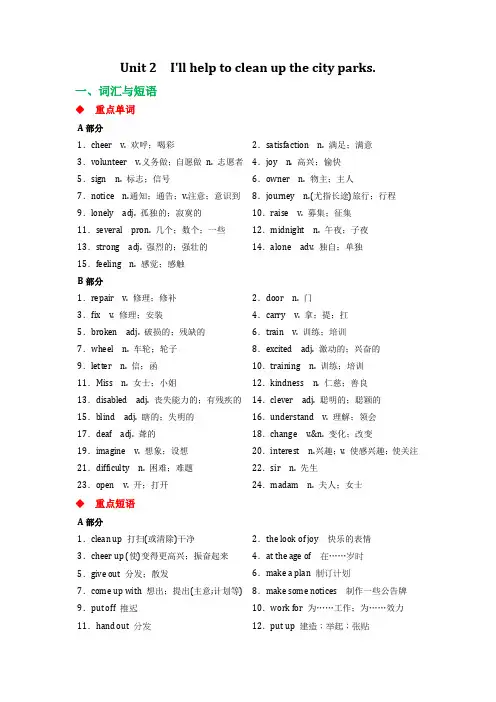
Unit 2 I'll help to clean up the city parks.一、词汇与短语◆重点单词A部分1.cheer v. 欢呼;喝彩2.satisfaction n. 满足;满意3.volunteer v.义务做;自愿做n. 志愿者4.joy n. 高兴;愉快5.sign n. 标志;信号6.owner n. 物主;主人7.notice n.通知;通告;v.注意;意识到8.journey n.(尤指长途)旅行;行程9.lonely adj. 孤独的;寂寞的10.raise v. 募集;征集11.several pron. 几个;数个;一些12.midnight n. 午夜;子夜13.strong adj. 强烈的;强壮的14.alone adv. 独自;单独15.feeling n. 感觉;感触B部分1.repair v. 修理;修补2.door n. 门3.fix v. 修理;安装4.carry v. 拿;提;扛5.broken adj. 破损的;残缺的6.train v. 训练;培训7.wheel n. 车轮;轮子8.excited adj. 激动的;兴奋的9.letter n. 信;函10.training n. 训练;培训11.Miss n. 女士;小姐12.kindness n. 仁慈;善良13.disabled adj. 丧失能力的;有残疾的14.clever adj. 聪明的;聪颖的15.blind adj. 瞎的;失明的16.understand v. 理解;领会17.deaf adj. 聋的18.change v.&n. 变化;改变19.imagine v. 想象;设想20.interest n.兴趣;v. 使感兴趣;使关注21.difficulty n. 困难;难题22.sir n. 先生23.open v. 开;打开24.madam n. 夫人;女士◆重点短语A部分1.clean up 打扫(或清除)干净2.the look of joy 快乐的表情3.cheer up (使)变得更高兴;振奋起来4.at the age of 在……岁时5.give out 分发;散发6.make a plan 制订计划7.come up with 想出;提出(主意;计划等)8.make some notices 制作一些公告牌9.put off 推迟10.work for 为……工作;为……效力11.hand out 分发12.put up 建造;举起;张贴13.call up 打电话给(某人);征召14.for example 比如;例如15.used to 曾经……;过去……16.raise money 筹钱;募捐17.care for 照顾;非常喜欢18.at least 至少19.try out 参加……选拔;试用20.come true 实现21.Clean-Up Day 清洁日22.at the same time 同时23.an old people's home 养老院24.be worried about 担心25.help out with sth. 帮助解决困难26.in one's free time在某人的业余时间B部分1.fix up 修理;装饰2.think about 考虑;思考3.give away 赠送;捐赠4.give sb. orders 给某人下命令5.take after (外貌或行为)像6.the idea of doing sth. 做某事的想法7.set up 建起;设立8.because of 因为;由于9.make a difference 影响;有作用10.at once 立刻;马上11.be similar to 与……相似12.do the volunteer job 做志愿者工作13.be able to 能够14.work out fine 圆满解决15.be excited about (doing) sth. 对(做)某事感到兴奋◆重点句子A部分1.The boy could give out food at the food bank. 这个男孩可以在食品救济站分发食物。
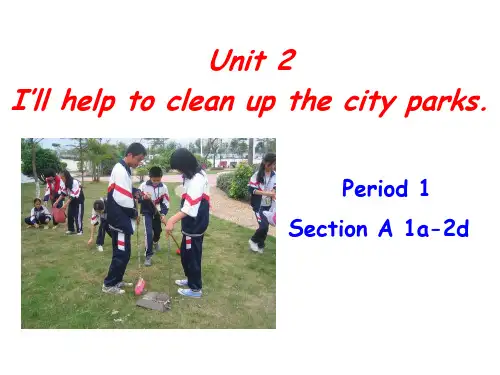
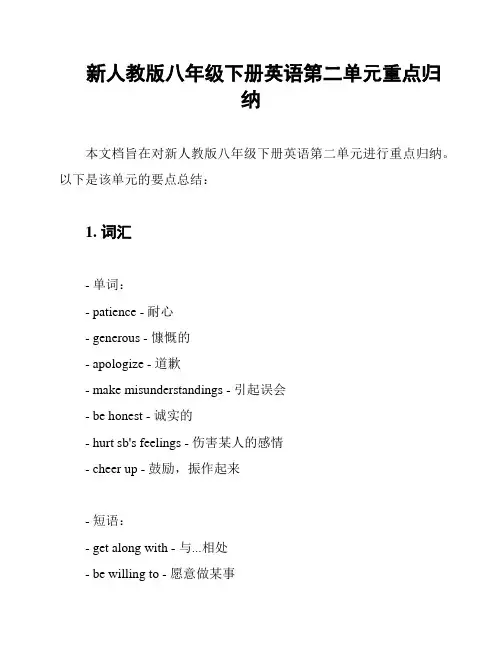
新人教版八年级下册英语第二单元重点归纳本文档旨在对新人教版八年级下册英语第二单元进行重点归纳。
以下是该单元的要点总结:1. 词汇- 单词:- patience - 耐心- generous - 慷慨的- apologize - 道歉- make misunderstandings - 引起误会- be honest - 诚实的- hurt sb's feelings - 伤害某人的感情- cheer up - 鼓励,振作起来- 短语:- get along with - 与...相处- be willing to - 愿意做某事- be considerate of - 体贴,考虑到- apologize to sb for sth - 为...向某人道歉- be honest with - 对...诚实- make up for - 弥补2. 语法- 宾语从句:在表示感觉、思考、相信等动词后面使用,引导宾语从句的连词有:that, if, whether等。
- 例句:I think that they are good friends.- 情态动词should:表示应该、或者建议做某事。
- 例句:You should apologize to him for what you said.- 主谓一致:主语与谓语动词在人称和数上要保持一致。
3. 句型- It's important (for sb.) to do sth.:做某事(对某人)很重要。
- 例句:It's important for us to be honest with each other.- What should I do?:用于询问对方应该做什么。
- 例句:What should I do if I hurt his feelings?4. 对话和交流技巧- 学会倾听他人的意见。
- 学会为自己的行为向他人道歉。
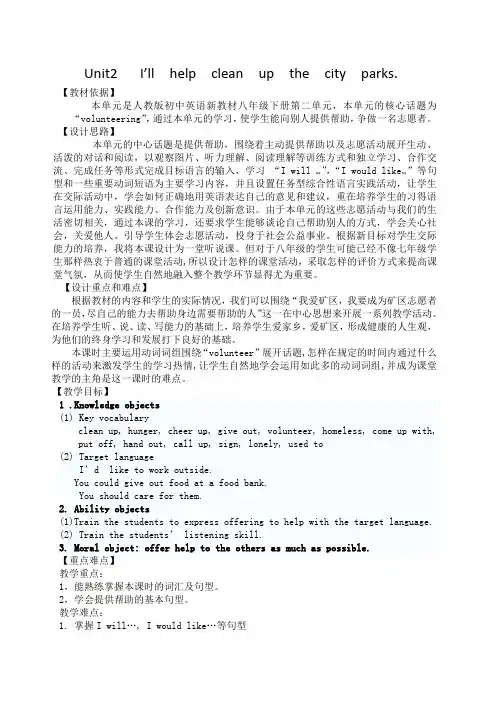
Unit2 I’ll help clean up the city parks.【教材依据】本单元是人教版初中英语新教材八年级下册第二单元,本单元的核心话题为“volunteering”,通过本单元的学习,使学生能向别人提供帮助,争做一名志愿者。
【设计思路】本单元的中心话题是提供帮助,围绕着主动提供帮助以及志愿活动展开生动、活泼的对话和阅读,以观察图片、听力理解、阅读理解等训练方式和独立学习、合作交流、完成任务等形式完成目标语言的输入,学习“I will …”,“I would like…”等句型和一些重要动词短语为主要学习内容,并且设置任务型综合性语言实践活动,让学生在交际活动中,学会如何正确地用英语表达自己的意见和建议,重在培养学生的习得语言运用能力、实践能力、合作能力及创新意识。
由于本单元的这些志愿活动与我们的生活密切相关,通过本课的学习,还要求学生能够谈论自己帮助别人的方式,学会关心社会,关爱他人。
引导学生体会志愿活动,投身于社会公益事业。
根据新目标对学生交际能力的培养,我将本课设计为一堂听说课。
但对于八年级的学生可能已经不像七年级学生那样热衷于普通的课堂活动,所以设计怎样的课堂活动,采取怎样的评价方式来提高课堂气氛,从而使学生自然地融入整个教学环节显得尤为重要。
【设计重点和难点】根据教材的内容和学生的实际情况,我们可以围绕“我爱矿区,我要成为矿区志愿者的一员,尽自己的能力去帮助身边需要帮助的人”这一在中心思想来开展一系列教学活动。
在培养学生听、说、读、写能力的基础上,培养学生爱家乡,爱矿区,形成健康的人生观,为他们的终身学习和发展打下良好的基础。
本课时主要运用动词词组围绕“volunteer”展开话题,怎样在规定的时间内通过什么样的活动来激发学生的学习热情,让学生自然地学会运用如此多的动词词组,并成为课堂教学的主角是这一课时的难点。
【教学目标】1 .Knowledge objects(1) Key vocabularyclean up, hunger, cheer up, give out, volunteer, homeless, come up with, put off, hand out, call up, sign, lonely, used to(2) Target languageI’d like to work outside.You could give out food at a food bank.You should care for them.2. Ability objects(1)Train the students to express offering to help with the target language.(2) Train the students’ listening skill.3. Moral object: offer help to the others as much as possible.【重点难点】教学重点:1,能熟练掌握本课时的词汇及句型。
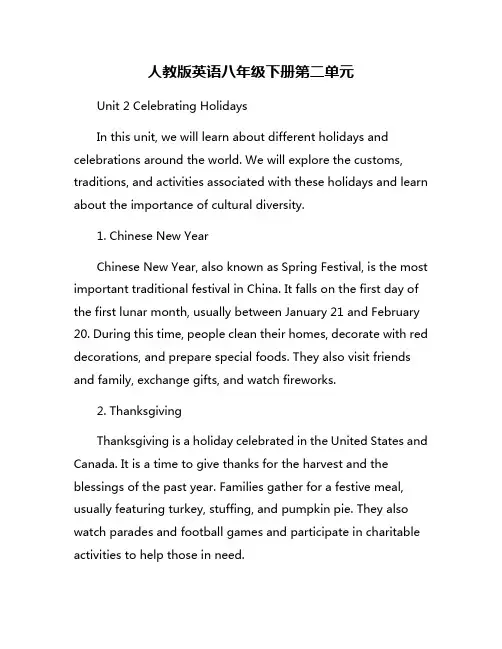
人教版英语八年级下册第二单元Unit 2 Celebrating HolidaysIn this unit, we will learn about different holidays and celebrations around the world. We will explore the customs, traditions, and activities associated with these holidays and learn about the importance of cultural diversity.1. Chinese New YearChinese New Year, also known as Spring Festival, is the most important traditional festival in China. It falls on the first day of the first lunar month, usually between January 21 and February 20. During this time, people clean their homes, decorate with red decorations, and prepare special foods. They also visit friends and family, exchange gifts, and watch fireworks.2. ThanksgivingThanksgiving is a holiday celebrated in the United States and Canada. It is a time to give thanks for the harvest and the blessings of the past year. Families gather for a festive meal, usually featuring turkey, stuffing, and pumpkin pie. They also watch parades and football games and participate in charitable activities to help those in need.3. DiwaliDiwali, also known as the Festival of Lights, is a Hindu festival celebrated in India and by the Indian diaspora around the world. It marks the victory of light over darkness and good over evil. People celebrate by decorating their homes with colorful lights, candles, and flowers. They also exchange sweets and gifts, perform prayers and rituals, and set off fireworks.4. HanukkahHanukkah is a Jewish holiday that lasts for eight days and nights. It commemorates the rededication of the Holy Temple in Jerusalem and the miracle of the oil that lasted for eight days. Families light a special candle holder called a menorah, exchange gifts, play games, and eat traditional foods like latkes and sufganiyot. They also sing songs and recite prayers to celebrate the holiday.5. Eid al-FitrEid al-Fitr is a Muslim holiday that marks the end of Ramadan, the month of fasting. It is a time for feasting, prayer, and giving to charity. Families gather for a special meal, visit friends and relatives, and exchange gifts. They also attendprayers at the mosque, listen to sermons, and enjoy festive activities like shopping and entertainment.In conclusion, celebrating holidays allows us to learn about different cultures, traditions, and values. It helps us appreciate the diversity of the world and the importance of sharing joy and happiness with others. By learning about and participating in different holidays, we can create a more inclusive and harmonious society for everyone.。
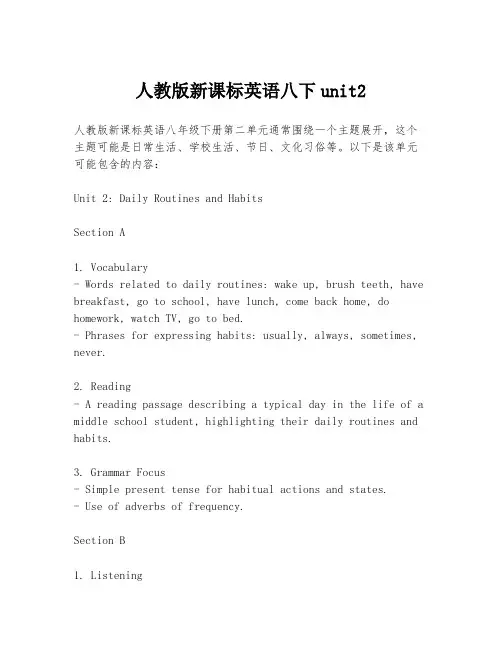
人教版新课标英语八下unit2人教版新课标英语八年级下册第二单元通常围绕一个主题展开,这个主题可能是日常生活、学校生活、节日、文化习俗等。
以下是该单元可能包含的内容:Unit 2: Daily Routines and HabitsSection A1. Vocabulary- Words related to daily routines: wake up, brush teeth, have breakfast, go to school, have lunch, come back home, do homework, watch TV, go to bed.- Phrases for expressing habits: usually, always, sometimes, never.2. Reading- A reading passage describing a typical day in the life of a middle school student, highlighting their daily routines and habits.3. Grammar Focus- Simple present tense for habitual actions and states.- Use of adverbs of frequency.Section B1. Listening- A dialogue between two students discussing their daily routines and comparing their habits.2. Speaking- Role-play activities where students interview each other about their daily routines and share their findings with the class.3. Writing- A writing task where students describe their own daily routines and compare them with a partner's.Section C1. Reading for Pleasure- A short story about a character who has a unique daily routine and how it affects their life.2. Grammar Practice- Exercises to practice the simple present tense and adverbs of frequency.3. Cultural Corner- Information about daily routines and habits in different cultures around the world.Section D1. Vocabulary Review- A review of the vocabulary introduced in the unit with matching and gap-fill exercises.2. Grammar Review- A review of the grammar points with a focus on the simple present tense and adverbs of frequency.3. Project- A project where students create a poster or a presentation about their ideal daily routine, incorporating elements from different cultures.Assessment- A quiz to test students' understanding of the vocabulary, grammar, and concepts covered in the unit.请注意,以上内容是基于常见的教学单元结构和主题进行的假设性描述,具体内容可能会根据实际教材有所不同。
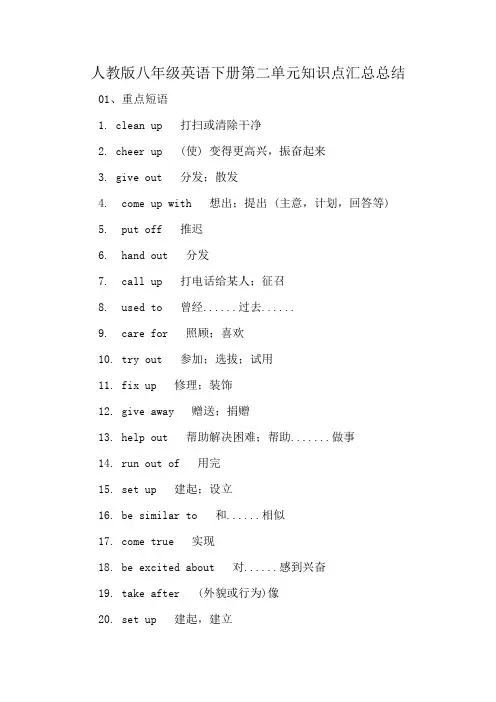
人教版八年级英语下册第二单元知识点汇总总结01、重点短语1. clean up 打扫或清除干净2. cheer up (使) 变得更高兴,振奋起来3. give out 分发;散发4. come up with 想出;提出 (主意,计划,回答等)5. put off 推迟6. hand out 分发7. call up 打电话给某人;征召8. used to 曾经......过去......9. care for 照顾;喜欢10. try out 参加;选拔;试用11. fix up 修理;装饰12. give away 赠送;捐赠13. help out 帮助解决困难;帮助.......做事14. run out of 用完15. set up 建起;设立16. be similar to 和......相似17. come true 实现18. be excited about 对......感到兴奋19. take after (外貌或行为)像20. set up 建起,建立21. make a difference 影响;有作用02、重点句子Grammar Focus 句子I’d like to help homeless people.我想帮助无家可归的人。
She decided to try out for a volunteer after-school reading program.她决定参加一个课外阅读项目的志愿者选拔。
You could ask hospitals to let you visit the kids and cheer them up.你可以请求医院让你看望那些孩子,并让他们高兴起来。
Mario believes it can help him to get his future dream job.马里奥相信这能帮助他找到将来梦寐以求的工作。
She volunteers there once a week to help kids to read.她每周去那儿做一次义工,帮助孩子们学习阅读。
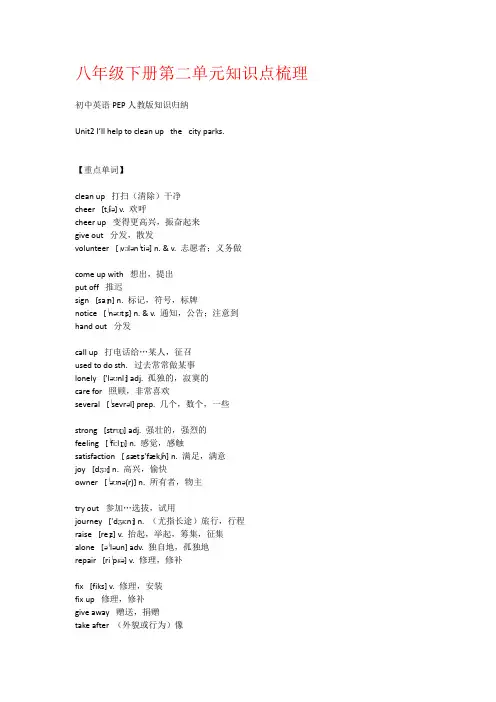
八年级下册第二单元知识点梳理初中英语PEP人教版知识归纳Unit2I’ll help to clean up the city parks.【重点单词】clean up 打扫(清除)干净cheer [tʃiə] v. 欢呼cheer up 变得更高兴,振奋起来give out 分发,散发volunteer [ˌvɔlənˈtiə] n. & v. 志愿者;义务做come up with 想出,提出put off 推迟sign [saɪn] n. 标记,符号,标牌notice [ˈnəʊtɪs] n. & v. 通知,公告;注意到hand out 分发call up 打电话给…某人,征召used to do sth. 过去常常做某事lonely ['ləʊnlɪ] adj. 孤独的,寂寞的care for 照顾,非常喜欢several [ˈsevrəl] prep. 几个,数个,一些strong [strɒŋ] adj. 强壮的,强烈的feeling [ˈfi:lɪŋ] n. 感觉,感触satisfaction [ˌsætɪs'fækʃn] n. 满足,满意joy [dʒɔɪ] n. 高兴,愉快owner [ˈəʊnə(r)] n. 所有者,物主try out 参加…选拔,试用journey ['dʒɜ:nɪ] n. (尤指长途)旅行,行程raise [reɪz] v. 抬起,举起,筹集,征集alone [əˈləun] adv. 独自地,孤独地repair [riˈpɛə] v. 修理,修补fix [fiks] v. 修理,安装fix up 修理,修补give away 赠送,捐赠take after (外貌或行为)像broken ['brəʊkən] adj. 破损的,残缺的wheel [wi:l] n. & v. 轮子,车轮;旋转letter [ˈletə] n. 信件,字母Miss [mɪs] n. 小姐set up 建立,设立disabled [disˈeibəld] adj. 有残疾的,丧失能力的make a difference 影响,有作用blind [blaɪnd] adj. 盲的,盲目的,失明的deaf [def] adj. 聋的imagine [ɪˈmædʒɪn] v. 想象,设想difficulty ['dɪfɪkəltɪ] n. 困难open [ˈəʊpən] v. 打开door [dɔ:] n. 门carry ['kærɪ] v. 携带,搬运train [treɪn] v. 训练,培养training [ˈtreɪnɪŋ] n. 训练,培训excited [ɪkˈsaɪtɪd] adj. 激动的,兴奋的kindness [ˈkaɪndnəs] n. 仁慈,善良,亲切,善意clever [ˈklevə] adj. 聪明的,机灵的understand [ˌʌndəˈstænd] v. 懂,理解change [tʃeɪndʒ] n. & v. 改变interest ['ɪntrəst] n. & v. 感兴趣;兴趣sir [sɜ:(r)] n. 先生madam ['mædəm] n. 夫人,女士【重点短语】1.Clean-Up Day 清洁日2. an old people’s home 养老院3. help out with sth.帮助解决困难4. used to过去常常......5. care for 关心;照顾6. the look of joy 快乐的表情7. at the age of 在......岁时8.clean up 打扫(或清除)干净9. cheer up (使)变得更高兴;振奋10. give out 分发;散发11. come up with 想出;提出12. make a plan 制订计划13. make some notices 做些公告牌14. try out 试用;试行15. work for 为…工作;为…. 效力16. put up 建造;举起;张贴17. hand out 分发;散发;发给18. call up 打电话;召集19. put off 推迟;延迟20. for example 比如;例如21. raise money 筹钱;募捐22. take after 与......相像;像23. give away 赠送;捐赠24. fix up 修理;修补;解决25. be similar to 与……相似26. set up 建立;设立27. disabled people 残疾人28. make a difference 影响;有作用29. be able to 能够30. after-school reading program 课外阅读项目【重点句型】1. The boy could give out food at the food bank. 这个男孩可以在食品救济站分发食物。
最新人教版八年级英语下册第二单元知识点汇总最新人教版八年级英语下册第二单元知识点汇总Unit 2 I'll help cleaarks.一.知识点:短语动词小结常见短语动词结构有下面几种:1. 动词 +副词如: give up放弃turn off关掉stay up熬夜这种结构有时相当于及物动词,如果其宾语是代词,就必须放在动词和副词之间,如果是名词,则既可插在动词和副词之间,也可放在短语动词后。
2.动词+介词如:l听look at看belong to属于这种结构相当于及物动词,后面跟宾语。
3.动词 +副词 +介词如: come up with 提出,想出run out of用完,耗尽4. 动词 +名词 ( 介词 ) 如: take part in参加catch hold of抓住 (sb.) up使(某人)高兴、振作如:up使我高兴clean up打扫clean-up n.打扫2. homeless adj.无家可归的 a homeless boy一个无家可归的男孩家 adj.生病的作表语、定语ill adj.生病的作表语,不能作定语5.voludo v.志愿效、主献volu 志愿者 up with提出想出up想出catch up with赶上追上7. put off doing推做某事put on穿上(指程)put up8. write down写下下9. call up打make a telall打10. set up成立建立The new hospital was set up in 2000.座医院是在2000年成立的。
11.each 每个各自的第一个人或事物的个情况常与of用every每个每一个的一切的有“全体”的意思不能与of 用12.put ⋯to use 把⋯投入使用,利用They puw mause. 他把新机器投入使用13. help sb. (to) do帮助某人做某事help him (to) studyhelp sb. w帮助某人做某事help him with Englishhelp do帮助做某事help study14. plan to do划做某事plan +从句I plan to go to Beijing. === I plan (that) I will go toBeijing.我划去北京。
人教版八年级下册英语第二单元unit2知识点总结Unit 2 What should I do?一丶重点短语1.argue v.争论;争吵argue with sb.与某人吵架I argued with my best friend.我和我的好朋友吵架了。
2.① either adv.(用于否定句)也He doesn’t have any money, and I don’t, either.他没有钱,我也没有。
I can’t play chess. She can’t, either.我不会下国际象棋,她也不会。
② too 也(用于肯定或疑问句)I’m a teacher.He is a teacher, too.我是老师,他也是老师。
3.ask (sb.)for sth.向某人寻求某物;要……Don't ask for food every day.Go and find some work.别天天要饭,找点儿工作做。
I don’t thi nk you should ask your parents for some money.我想你不应向父母要钱。
4.the same as... 与……相同(注意前后两个比较对象的属性保持一致)The clothes are the same as my friends'.这些衣服与我朋友的一样。
Tom is the same age as Anna.=Tom is as old as Anna.汤姆和安娜一样大。
Her backpack is the same as mine. 她的背包与我的一样。
5.except 除……以外;(不包括……在内)My class has been invited except me.除我以外,我的同学都被邀请了。
All the students went to the park except him.除了他之外,全体同学都去过公园了。
人教版八年级英语下册第二单元知识点归纳总结clean up:清理干净In our community。
there are many beautiful parks。
but they are often littered with trash。
To make our community a better place。
we need to clean up the parks and keep them clean。
This is a great way to make a difference and show that we care for our XXX.XXX up:振奋起来When we clean up the parks。
we can also cheer up the people who use them。
A clean and beautiful park can make people feel happy and proud of their community。
We can also give away XXX decorate the parks and make them even more beautiful.give out:分发To make our clean-up efforts more effective。
we can give out gloves and trash bags to the volunteers。
This will help them toclean up XXX from the trash。
We can also give out flyers to spread the word about our clean-up event and encourage more people to join us.used to:过去常常In the past。